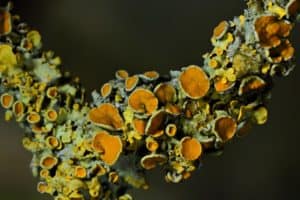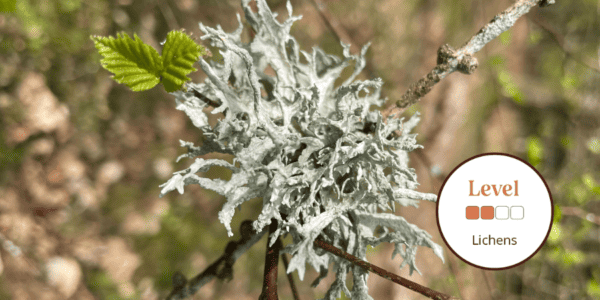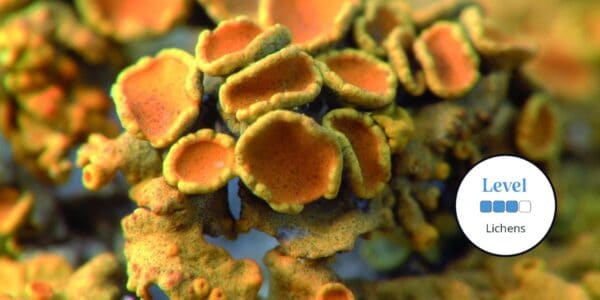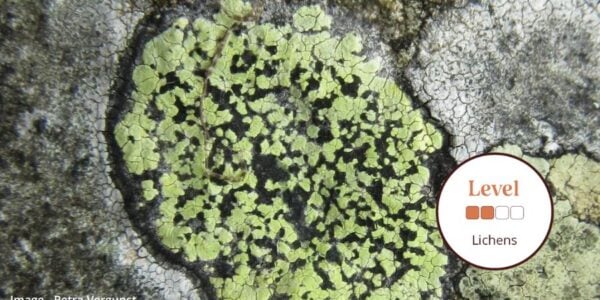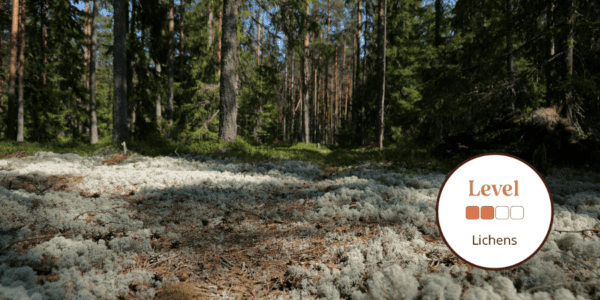This course has been cancelled. For a full list of our courses please click here
This course will demonstrate how recent and historic changes in management are reflected in lichen communities that we see around us today.
Lichens have been known as indicators of air quality since the industrial revolution when they disappeared from urban and industrial areas but why are they now reappearing in our cities and disappearing from our agricultural countryside?
This beginner/intermediate course will familiarise you with features used in the identification of common lichens on trees, including morphological and chemical characters. The use of lichens as indicators of environmental conditions including air quality, climate and ecological (historical) continuity will be demonstrated in the historic parkland at Nettlecombe and the ancient woodlands at Horner National Nature Reserve.
As part of this course, you will need to purchase the FSC publication – Lichens on twigs before you attend, as we will be using them throughout the course. This is a great tool to use both during and once you have completed the course allowing you to continue exploring and understanding this subject.
Click here to purchase your copy
PLEASE NOTE the course fee is for tuition only. There is no accommodation provided with this course. If you would like to book lunch and an evening meal at FSC Nettlecombe please email [email protected]
*Bookings will close if course capacity is reached
The course is for anyone interested in looking to gain confidence in being able to identify some of the most common lichens and understand their place as indicators
Who Should Attend?
Amateur naturalists, those interested in woodland/parkland management and conservation, Students, Rangers, Early career consultants and ecologists.
Knowledge Level
Intermediate. Level descriptors can be found on the following webpage: Framework and Course Level Descriptors
Prior Knowledge
An interest in the use of lichens as bioindicators and familiarity with the use of keys to identify organisms.
What will be covered during this course?
-
- Use of morphological and chemical characters to identify lichens
- Association of recent and historic land management practices with lichen communities on trees
- How to recognise lichen features using a X10 hand lens and a dissecting microscope
- Identification of key indicators of good and poor air quality and those associated with tree species and ecological continuity in parklands and woodlands.
By the end of the course, you will be able to:
-
- Explain what a lichen is, their ecology and threats
- Use basic identification guides with some confidence
- Identify how lichens are key indicators of good and poor air quality
- Link lichens to woodland/parkland management and conservation
- Use morphological and chemical characters to identify lichens
- Share this knowledge with friends, family, and fellow volunteers
The course gives you the opportunity to immerse yourself in a new subject and acquire novel skills. Our fantastic tutors will combine the use of classroom-led learning and outside learning opportunities to give individuals the skills and confidence to learn more about lichens.
-
- See the ‘Example Timetable’ and ‘What’s Included’ sections below for more information about this course
- Upon booking, you will need to provide individual details of all attendees
- Please email [email protected] if you have any questions
Group Bookings Made Easy
If you have a group of 10 or more individuals wanting to complete one of our courses, our team are available to discuss your options – from discounts to private team courses.
-
- Discounted rates
- Privately run courses for your group
- Bespoke courses developed specifically for your needs
Email [email protected] to discuss your options!
If we are unable reach viable numbers for this course, we will inform you of the course cancellation 14 days prior to the course run. We would recommend when purchasing accommodation and/or travel you should take out your own insurance.
Tutor: Pat Wolseley
Pat Wolseley is a lichenologist and past president of the British Lichen Society who lives at Nettlecombe but continues to work at the Natural History Museum as a part time Scientific Associate. She has worked on lichens as indicators of environmental conditions at home and in the tropics and was instrumental in the development of the national OPAL air quality project which used lichens as indicators of air quality across the UK. More recently she has put together a checklist of lichens of Somerset, together with Brian and Sandy Coppins, which is in press and which we will use on the course to check distribution of lichen communities in Somerset.Tutor: April Windle
April Windle is a naturalist with a particular interest in lichens. She is currently self-employed and involved in a variety of lichen education and conservation projects, alongside co-chairing the Education & Promotions Committee of the British Lichen Society. Her previous employment history includes Plantlife International, the Natural History Museum, Exmoor National Park Authority and the Royal Society for the Protection of Birds. LinkedIn: April Windle / Twitter: @aprilwindleBook with Confidence
We understand the difficulties of making plans in the current situation when guidelines continue to change, and insurance conditions are being tightened. In response, we will continue to offer additional flexibility. Find out more here
Example Timetable
Example Timetable
This timetable is subject to change but should give a clear outline of what to expect
- Please arrive in time for the course to start promptly at 10:00 am
- The course will end at 5:00 pm.
| 10:00am | Tutor introduction and classroom session covering:
|
| 11:30am | Break and prepare for field session – refreshments not provided |
| 11:45pm | Guided walk around the centre - use of fold out keys in the field |
| 1:00pm | Lunch – not provided |
| 2:00pm | Field visit to Park Wood. Looking at lichens on twigs and trunks of oak trees. Introduction to old forest indicators. |
| 3:45pm | Return to centre and break – refreshments not provided |
| 4:00pm | Looking at specimens in the lab and introduction to ancient woodland species at Horner |
| 5:00pm | End of day 1 |
| 10:00am | Introduction to day 2 – collect equipment |
| 10:15am | Field visit to Horner woods |
| 1:00pm | Lunch – not provided |
| 2:00pm | Continued field time |
| 3:00pm | Return to centre and break – refreshments not provided |
| 3:30pm | Looking at specimens in the lab and introduction to ancient woodland species at Horner |
| 4:30pm | Classroom plenary and final questions |
| 5:00pm | End of course |
Please note - accommodation, refreshments and an evening meal are not included
What's Included
The course has been carefully created by expert tutors and educators to help you build your knowledge and apply it within the field surrounded by like-minded individuals.
The course includes:
- Classroom learning covering the theory of the species
- Field excursions to apply new knowledge
- Expert tuition for which the FSC is renowned
You can rest assured that the absolute best content from an expert in environmental education will be provided. In choosing an FSC course, you will be joining thousands of people who learn with us each year.
Before You Attend
Before you Attend:
This course requires you to purchase the FSC publication - Lichens on twigs before you attend
Please note that accommodation is unavailable at FSC Nettlecombe for the duration of this course.
Please see the links below for alternative accommodation - B&B’s that are located near to the centre
- Notley arms in Monksilver
- The White Horse Inn, Washford
- The Washford Inn, Washford
What to Bring:
- Notebook and pencil
- Lunch and refreshments
- Sensible footwear and clothing for being outdoors
- Small bag to carry personal items
If you have them:
- Hand lens
- Your own reference book(s)
You may also wish to purchase the FSC Guide Lichen based index to nitrogen air quality to enhance your experience
There will be a member of staff with first aid training and access to a first aid kit on site. If you have special medical or access requirements, please let us know as soon as possible so we can plan the course.
Sorry this course has ended

